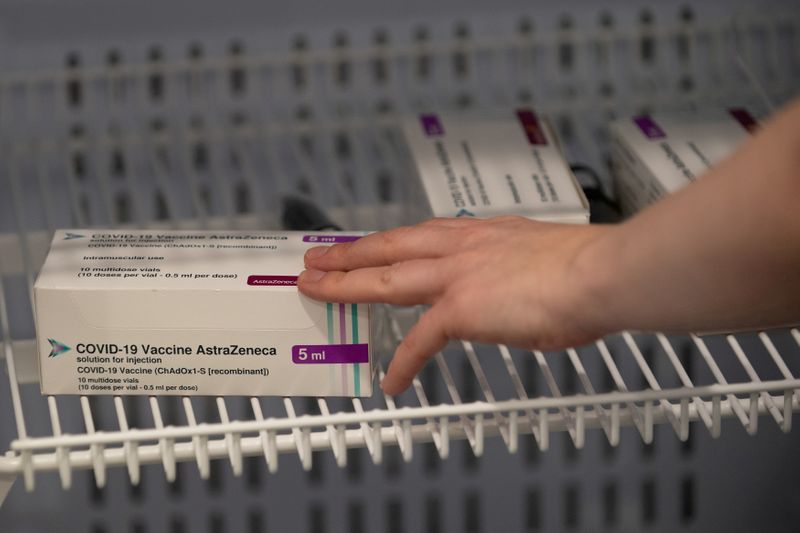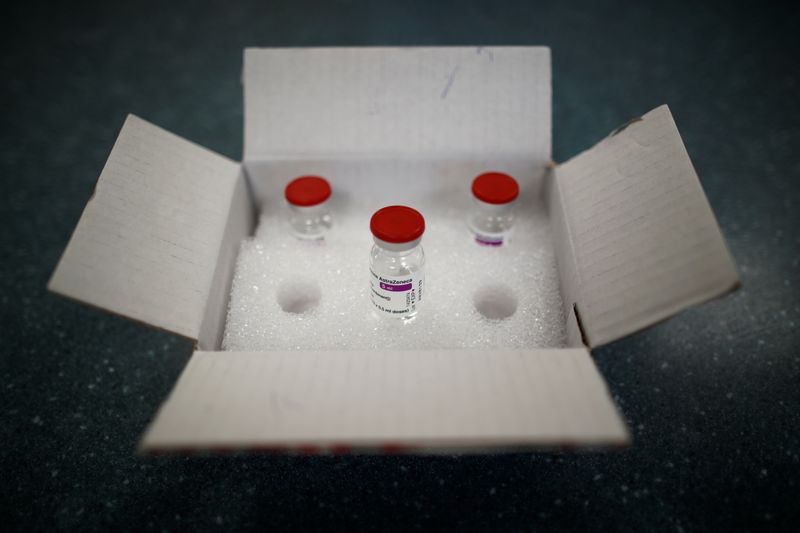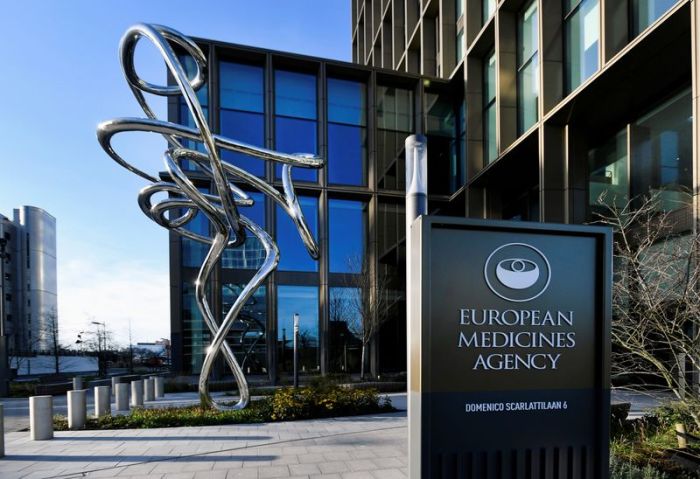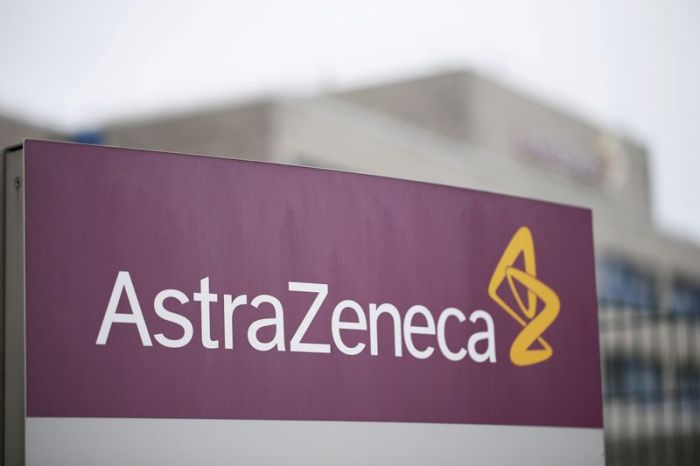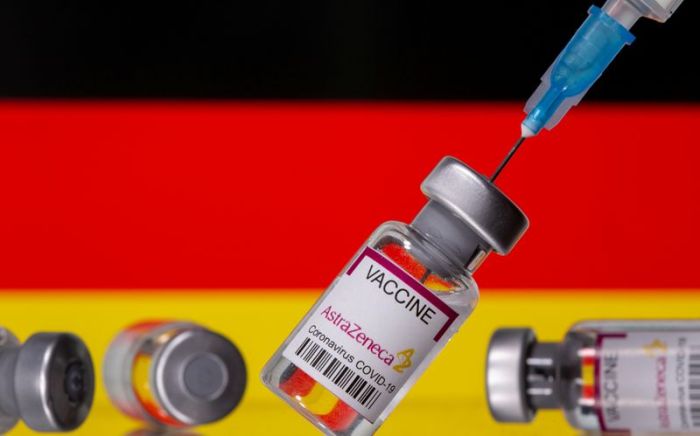AMSTERDAM (Reuters) – Global health experts came under increasing pressure on Tuesday to clear up questions over the safety of AstraZeneca’s COVID-19 shot, as Sweden and Latvia joined countries suspending their use in a further blow to Europe’s vaccination rollout.
The European Medicines Agency (EMA) said it was investigating reports of 30 cases of unusual blood disorders out of 5 million recipients of the AstraZeneca vaccine. In total, 45 million COVID shots have been delivered across the region.
The EU regulator will release its findings on Thursday but its head, Emer Cooke, said she saw no reason to change its recommendation of AstraZeneca – one of four vaccines that it has approved for use.
“The benefits continue to outweigh the risks, but this is a serious concern and it does need serious and detailed scientific evaluation,” Cooke told a news conference.
A World Health Organization (WHO) committee of experts was reviewing the cases and was expected to issue a statement by the end of the day, a spokesman said.
The EU’s largest members – Germany, France and Italy – suspended use of AstraZeneca’s vaccine on Monday pending the outcome of investigations into unusual cases of a rare cerebral thrombosis in people who had received it.
The addition of Sweden and Latvia on Tuesday brought to 13 the number of EU countries to act since reports first emerged of thromboembolisms affecting people after they got the AstraZeneca shot.
The WHO and EMA had earlier joined AstraZeneca in saying there is no proven link, but some experts said the episodes of blood clots, bleeding and low platelet counts in younger people seemed to indicate a causal connection to the AstraZeneca shot.
“The benefits of vaccination significantly outweigh the risks, especially for the elderly,” said Karl Lauterbach, health spokesman for Germany’s Social Democratic Party.
“But it could be the case that the risks of the vaccine are higher for certain patient groups such as young women,” Lauterbach, an epidemiologist whose party is part of the Berlin coalition, told Deutschlandfunk radio in an interview.
Other epidemiologists note that similar cases have not been found in unusual numbers in Britain, which began using AstraZeneca earlier and has given more than 10 million doses.
“A very likely explanation of at least some of the clotting disorders seen are a result of COVID-19 rather than the vaccine,” said Stephen Evans, professor of pharmacoepidemiology at the London School of Hygiene and Tropical Medicine.
“There are published papers that make clear that these problems definitely occur in COVID-19 and there is no doubt that all the vaccines in use prevent that disease. Hence the risk and benefit balance for the AstraZeneca vaccine remains clearly in favour of its benefits.”
Graphics: Vaccine rollout across EU by brand – https://fingfx.thomsonreuters.com/gfx/mkt/qzjpqlwaqvx/vaccine%20rollout.PNG
ECONOMIC FALLOUT
In the EU’s largest states, including Germany, France, Italy, the Netherlands and Spain, AstraZeneca has accounted for about 13-15% of shots given since the rollout began almost three months ago, with Pfizer-BioNTech making up the majority, according to official data.
As one as the cheapest to be developed, the AstraZeneca shot is set to be the mainstay of vaccination programmes in much of the developing world.
Governments say they acted on the AstraZeneca shot out of an abundance of caution – of 1.6 million people in Germany given the vaccine, seven fell ill with a very rare cerebral vein thrombosis of whom three died.
In a detailed analysis of its findings Germany’s vaccine oversight body, the Paul Ehrlich Institute, said six of the cases were in women of young or middle age – a number statistically significantly higher than normally expected.
Nicola Magrini, the director general of Italy’s medicines authority AIFA, told daily la Repubblica the AstraZeneca shot was safe and its benefit to risk ratio was “widely positive”. There have been eight deaths and four cases of serious side-effects in Italy following vaccinations, he added.
In France, Health Minister Olivier Veran told reporters the risk-reward ratio for the AstraZeneca vaccine remained positive.
A third wave of infection in Europe, driven by more infectious viral variants, threatens to worsen a pandemic that has claimed 575,000 lives in the European Union and further delay recovery from a pandemic economic slump.
Deutsche Bank on Tuesday slashed 2021 economic growth forecasts for the euro area by a whole percentage point, citing spillover of the ongoing pandemic-linked activity restrictions.
Coronavirus infections are rising exponentially in Germany, an expert at the Robert Koch Institute for infectious diseases said, putting at risk plans to lift its lockdown. France is considering a possible third national lockdown.
Vaccination campaigns had got off to a slow start due to scarce supply, but the European Commission said on Tuesday it expects to receive more than 200 million doses of vaccine from Pfizer and BioNTech in the second quarter, putting the EU on course to meet its targets.
The EU aims to vaccinate at least 255 million people, or 70% of its adult population, by the end of the summer. The bloc has administered 11 shots so far for every 100 residents, while Israel – a world leader in vaccination – has given 108 doses, according to Our World in Data.
(Anthony Deutsch reported from AMSTERDAM and Caroline Copley from BERLIN; Additional reporting by Kate Kelland, Elizabeth Piper, Giulia Segreti, Emilio Parodi, Matthias Blamont, Sudip Kar-Gupta, Matthieu Protard, Andreas Rinke, Francesco Guarascio, Anna Ringstrom, Johan Ahlander and Andrius Sytas; Writing by Douglas Busvine; editing by Josephine Mason and Philippa Fletcher)

